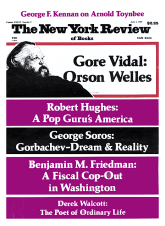In response to:
'The Two French Revolutions': An Exchange from the May 18, 1989 issue
To the Editors:
Were I to have rendered the passage from the letter of the marquis de Ferrières to his wife cited by Norman Hampson [Letters, NYR, May 18: “Cette France, ma patrie …etc.] as “O my dear France, amiable and good people, I have made an eternal alliance with you. Before this day I had no patrie; now I have one and it will always be dear to me,” I would indeed be guilty not just of the “impressionistic” use of sources he attributes to me but seriously bungled mistranslation as well.
In actual fact, my translation is of another passage altogether, further on in the same letter (May 6, 1789), as Hampson would have discovered had he bothered to turn the page (p. 44, in the Henri Carré 1932 edition of Ferières’ correspondence). The correct sentence is: “Oh ma chère France, peuple amiable et bon, oui, j’ai fait une eternelle alliance avec toi; avant ce jour, je n’avais point de patrie; j’en ai une qui me sera toujours chère.” Though perhaps a little literal, my version seems a reasonable and unimpressionistic approximation.
Simon Schama
Cambridge, Massachusetts
Norman Hampson replies:
I owe Simon Schama a sincere apology. I had indeed mistaken the passage for the correspondence of the marquis de Ferrières, which he translated irreproachably. My other reservations remain.
This Issue
June 1, 1989



